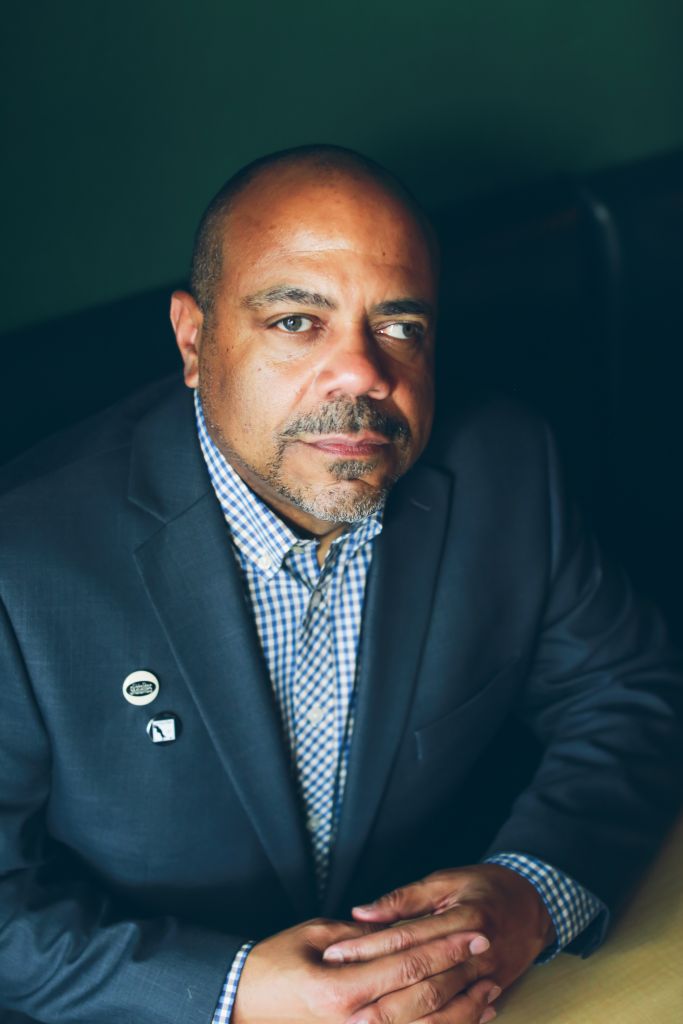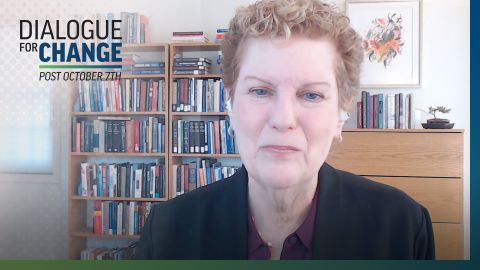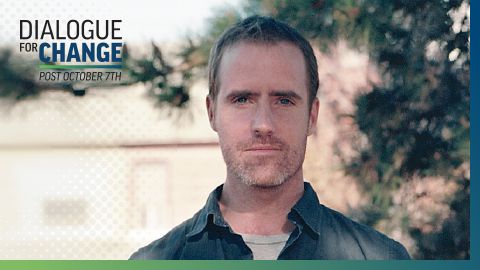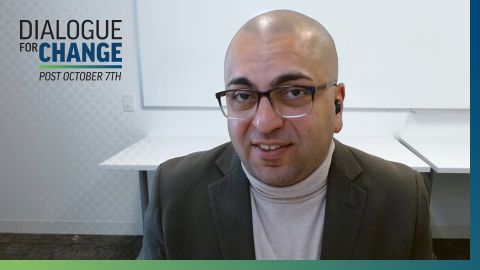Eric Ward [00:00:00] We are shouting. We are screaming at one another. Some of us are engaging in physical assaults on one another. None of that has anything to do with bringing real resolution and solution to a crisis that is happening in Palestine and Israel.
Hari Sreenivasan [00:00:28] Eric Ward began his civil rights career more than 30 years ago as a community organizer in the Pacific Northwest. His field research on the far right led him to infiltrate white nationalist groups —dangerous work for a young black man.
Hari Sreenivasan [00:00:43] Today, Eric Ward is executive vice president of the nonprofit racial justice organization Race Forward. He writes for numerous publications, is a prominent advocate for inclusive democracy, and is a nationally recognized expert on authoritarian movements and hate groups. He testified before Congress in the aftermath of the January 6th attack on the US Capitol.
Hari Sreenivasan [00:01:05] In 2021, Eric became the first American recipient of the Civil Courage Prize, an honor awarded to individuals who pursue justice at great personal risk. The late Russian rights activist Alexei Navalny was also a recipient of this award. We spoke with Eric about America’s renewed need for civil courage here at home, as protests and outrage over October 7th and the Israel-hamas War continue to divide the country.
Hari Sreenivasan [00:01:36] Eric, you have studied and worked on civil rights issues and issues regarding hatred and antisemitism for decades now. And I wonder what you are seeing in this post October era. What has been happening online and offline when it comes to hatred and anti-Semitism?
Eric Ward [00:02:04] We are seeing a significant rise in anti-Semitic and Islamophobic, incidences. The piece that’s alarming in this moment is that that hate violence is not being seeded by the rhetoric of white nationalist authoritarians or hate groups. That hate violence and the environment that gives way to it is being seeded by those who say that they care about what is happening in Israel and in Palestine. It is irresponsible rhetoric and online activity that is creating an environment for hate, and it is causing harm, not just in Israel and Palestine. It is causing harm right here in the United States. It is dividing the civil rights coalition that is the bulwark against authoritarianism in this country. It is driving an increase in hate crimes, and it is causing other harms in our society that we’re not paying attention to.
Hari Sreenivasan [00:03:09] So tell me a little bit about how it’s dividing the Civil Rights Coalition here.
Eric Ward [00:03:14] Absolutely. We in the United States rightfully are concerned about the level of violence and death and displacement that is happening in that region right now. Tens of thousands of people have been killed in Gaza. Israel experienced one of the largest acts of violence targeting Jews since the Holocaust. I do not doubt that people care about ending the violence and the sectarian tensions that are happening in Israel and in Palestine right now. However, what is happening is that many of us are using it as our own emotive moment, right? As if it is something that is happening right here in the United States, rather than happening to vulnerable communities in the Middle East. We are shouting. We are screaming at one another. Some of us are engaging in physical assaults on one another. None of that has anything to do with bringing real resolution and solution to a crisis that is happening in Palestine and Israel. Because of this, it has become a new line within the civil rights community around where you stand. The fracturing and the tension is very real. Things that are being said in emotional states have long term consequences. It undercuts credibility. It undercuts trust. And that’s what we’re seeing amongst many, far too many leaders in this moment. Irresponsible rhetoric that is causing irresponsible harm to deep relationships that are needed to defend democracy and the idea of inclusion here in our own country.
Hari Sreenivasan [00:05:03] I don’t know if this is too soon, and maybe we’ll kind of look back at this event, in this conflict in a few years and see it as a turning point. But I wonder if you think that this conflict now has created increased tensions, or a greater rift between the Black and Jewish communities in the United States?
Eric Ward [00:05:25] I think that there are, far too many people and political formations in this country who would like that to be the case. They would love to see the shattering of the Black Jewish coalition that has advanced civil rights, that has advanced opportunity in this country, for nearly three generations. This is a very difficult moment, for the Jewish community and for the Black community. But any student of civil rights in this country understands that the Black Jewish relationship is cruacial to advancing civil rights in this country. And those who oppose civil rights in this country understand that, too. So, yes, people will seek to take advantage of the tension in order to fracture it, including people within the Black and Jewish community themselves. But for those of us who understand that equity and opportunity is a critical part of democracy. Those of us who are Black and Jewish leaders, we will continue to do the hard work of staying in the room together, even on the most difficult days.
Hari Sreenivasan [00:06:43] You know, when you talk about the civil rights movement, I think back to a struggle for the oppressed, the underclass. And right now in America, there seem to be more progressives lined up on the sides of the Palestinians in Gaza because they empathize in a way with the underclass and the oppressed and the struggle.
Eric Ward [00:07:08] Yes. Look, of course we have sympathy for the conditions that Palestinians, reside under. I think one of the things that is unique to Black America, based off of its experience here in the United States, is that we are always sympathetic to those who we feel are being targeted unfairly, are being discriminated against. It is part of of what it means to be Black in America, to carry that kind of empathy, that kind of concern. I have walked the streets of the West Bank. I understand, as an African American, what it means to live in a society that is facing harsh, harsh conditions, absolutely. Facing human rights violations, discrimination. However, we have to understand there is more to the story. It is not the story of Black Americans in the United States. This is the story of Palestinians in Palestine. It has its own variables, its own uniqueness, and we fail when we try to flatten it to our own experiences. We forget that there have always been Jews who have lived in the Middle East region for generations, and many of them fled also to Israel, fleeing persecution. What we forget is that this is ultimately tension between two peoples who have legitimate indigenous claims to the same land. This is a time that calls for nuance, and we are sophisticated as a civil society to have that nuanced conversation and still demand the end of violence, the upholding of rights for all, and a permanent solution that resolves the sectarian tension in that region.
Hari Sreenivasan [00:09:20] I wonder, as you’ve worked with different groups for so long. What is it about us that wants to, I guess, just simplify complicated issues? I mean, to reduce things. To flatten them. To draw parallels. I mean, what is it that motivates that? What is it that doesn’t allow us to see nuance or this distinction?
Eric Ward [00:09:48] I think some of it is, simplification draws clear lines. Are you on this side or are you on, that side? And, that has often been part of the culture and narrative in America, right? Are you the cowboy with the black hat or, the cowboy with the white hat? Are you good or evil? These types of binaries function in our society on a narrative level. Each and every day. So it’s not surprising to see us adopt those binaries in our understanding of the world, whether they apply or not. What’s shocking is, is when they don’t apply, we then engage in shifting and ahistorical, conversations and reframing in order to force things into these binaries that don’t work, nor do they explain the complexities of what’s happening in a place such as Israel and Gaza. I think it is, the way we have been socialized as Americans. And then it’s our laziness as leaders, to speak to our communities in a way that brings nuance.
Hari Sreenivasan [00:11:06] Give me some examples.
Eric Ward [00:11:07] Comparing Israel to to Nazi Germany is ahistorical. It places Jews, as is a nefarious author in ways that, we would not place other communities or in this world. I’m thinking about the conflict in Tigray, right, where a million people were killed right in, in a two year period. I’m thinking of Western Sahara. Were migrants. And if, refugees, 600,000 people killed over the last, decade. The Sudan. I’m thinking about places where we don’t need to make comparisons to Nazi Germany to be outraged about what is happening in those communities. Another example, though, is framing those who care about Palestinian rights, whether they get it right or not, each day, as if somehow they are supporters of Hamas. That is othering and dangerous targeting of college students and young people who are trying to find their way forward and making those kinds of false claims puts them in real physical danger. Putting placards on vehicles calling the students out, places them in physical danger. That is irresponsible leadership on both ends and it needs to stop. We are not here to be walking memes in this moment. This is, we are not the ones dying. We are not the ones hiding under rubbles. We are not the ones wondering if our families will ever come home because they have been kidnaped. We are the people who are supposed to be providing a solution. And what we are providing is more anti-Semitism and more Islamophobia. It is simply unacceptable.
Hari Sreenivasan [00:13:04] You wrote back in 2017 and, an article called “Skin in the Game: How Antisemitism Animates White Nationalism.” And back when you wrote that you were looking primarily at antisemitism coming from the right. And I wonder, has it increased coming from the left, or is that a different dynamic?
Eric Ward [00:13:22] There is, antisemitism that is being tapped into, from the left. I often say there is no right wing antisemitism or left wing antisemitism. There is merely antisemitism in society and how political and social leaders, and movements, choose to tap into that antisemitism. Antisemitism on the right is concerning because it is being tapped into consciously and intentionally in order to organize a political base. Antisemitism on the left is dangerous because it is, there is an arrogance, an unwillingness to admit that it exists, as if admitting that it exists would undercut the call for human rights in Gaza and Palestine. And, I think that that is a shame. And it’s it’s dangerous. But the truth is, is that antisemitism can erupt anywhere. And we are seeing it right now in the Racial Justice and, and left movements. And it does not bring me joy to have to point that out. We are the movements that, should be more ethical, more responsible and more aware. And we’re falling short right now.
Eric Ward SOT Civil Courage Prize [00:14:46] The health of democracy in the United States has very real consequences for the health of the world. a
Hari Sreenivasan [00:14:54] In 2021, you, were the first recipient of this Civil Courage Prize. And it was honoring, quote, the extraordinary few among us who resolutely pursue freedom for many, despite the consequences to themselves. And in your acceptance speech, you said something interesting, and you said the honor was both an affirmation of your work and a red flag. What do you mean by that?
Eric Ward [00:15:19] This was the first time an American had received the the Civil Courage Prize, and I believed I received it not just as an individual, but because of the work of many of us, thousands of us over decades, who understood that this country was entering a period where there would be the rise of a white nationalist movement that would seek to undercut democracy. The fact that this award was given was a red flag, that it was no longer just the thousands of us, over decades doing this work, but that an organization that that understands human rights and democracy around the world was now signaling that that threat had come to full maturity here in the United States. It was a warning, I think, to the American civil rights leadership to wake up and to take this moment seriously, to understand, America is not exceptional and that the democracy that has been built through black struggle and the struggle of women, immigrants, poor whites, Latinos and others is under threat. And it’s fragile. And perhaps the ways we are walking around the issue of Palestine and Israel are making us even more fractured, has a democracy that really could be built on the concept of a multiracial America?
Hari Sreenivasan [00:16:52] Yeah. So how do we break out of these echo chambers, of listening to our own opinions, our own kind of preconceived notions, or spewed back at us through cable channels that we like to watch? You know, how do we hear other opinions or allow ourselves to hear other opinions in an attempt to move forward?
Eric Ward [00:17:15] Yeah, I understand this is a political moment, and asking folks from the left all the way across to the right to ignore politics is simply not going to happen. What I am saying, though, is that politics is not all who we are, has people in as individuals. And so one of the things that we can begin to do is just talk to our neighbors and to hold the nuances in the complexity that are our neighbors. We have to begin to ask more courageous questions. And we have to be willing to listen rather than fall into the debate that news media has often taught us to lean into. How can we find real solutions to bring a resolution to the violence? And isn’t that what we should all be seeking right now? That’s what it means to be a real ally right now. To understand there are tens of thousands of people who are dying. Living in fear. And our job is to remove the fear, to remove the killing so that real solutions can be found.
Hari Sreenivasan [00:18:23] Eric Ward, executive Vice president at Race Forward. Thanks so much.




